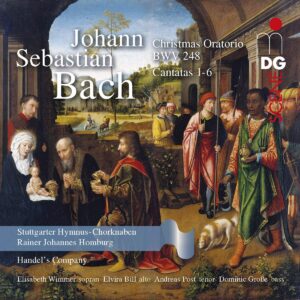The easiest way of telling that Thanksgiving is near is when new releases of the Christmas Oratorio start rolling in. A look from desk to calendar quickly confirms this. Here we have Handel’s Company and the Stuttgart Hymnus Choirboys, along with a cast of lesser-known soloists. What have they to say about these six cantatas that we should listen up? Is this recording with trebles going to be as wet a squib as the just-reviewed Kings’ College Matthew Passion?
Well, there are a couple of differences right off the bat. For one, the cantatas of BWV 248, being associated with the high-holiday, get me into a charitable mood where I suffer trebles more gladly. Or is it that I associate the Christmas Oratorio more with an occasion–sacred Gebrauchsmusik–than I consider it a repertoire concert piece? No matter: Even if you don’t share those particular sentiments, the Stuttgart boys still fare better than their English counterparts in that recent outing. While occasionally on the timid side, a bit fallow, and not quite the confident ideal, they do well enough throughout, are never outright ungainly, and usually very pleasing, indeed–which is more than can be said about most recordings with trebles. And they handle the tempos–moderate by modern standards–with aplomb!
They are ably aided and abetted by a young cast which, however much lacking (for now) in ready international name recognition, is terrific. After starting to praise Elvira Bill for her fine, clear voice and splendid delivery–a sort of alto version of Nuria Rial–I remembered how she impressed in Gotthold Schwarz’s recording of the same work with the Thomaner Boys Choir (Accentus, also reviewed on Classicstoday.com) for her “characterful and expressive voice with an easy top, a clear ring to it, and a clever, appealing treatment of the text and switched-up repeats.” Same here.
Soprano Elisabeth Wimmer also gives a fine, slightly neutral account that is happily more artless than faceless and has plenty of warmth even to the very top of her voice. Andreas Post is an experienced evangelist, despite his relative youth, with a natural delivery and clear ring to it, free of discolorations, mannerism, and altogether uplifting. Little wonder the late and much-missed Enoch zu Guttenberg, always with a nose for young and willing talent, had repeatedly called on him in that capacity.
Among half-measure interpretations that use an authentic boys choir for the choral bits but prop it up with adult soloists, this is good stuff, bested only by Chailly’s more robust, more pointedly orchestral rendering (Decca) and the aforementioned Gotthold Schwarz recording (Accentus), which is also available as audio-only, not just Blu-ray. For a recording to cast every part with choristers, the 1970s Archiv Produktion release with the Regensburger Domspatzen under Hanns-Martin Schneidt is still a good choice, despite the naturally more accommodating tempos.
































